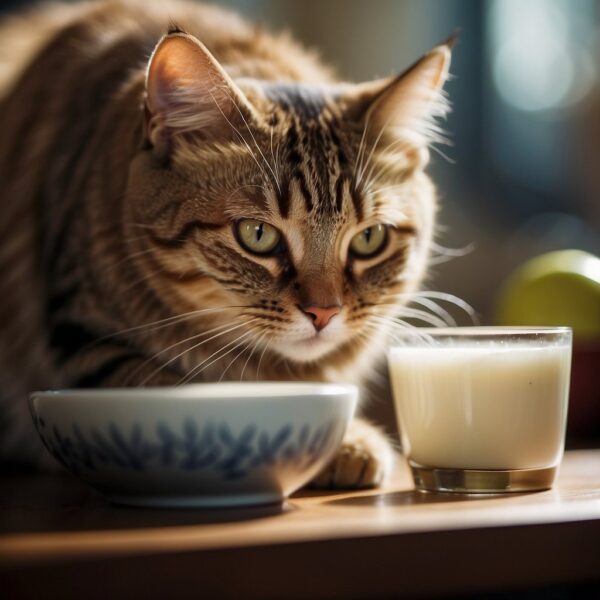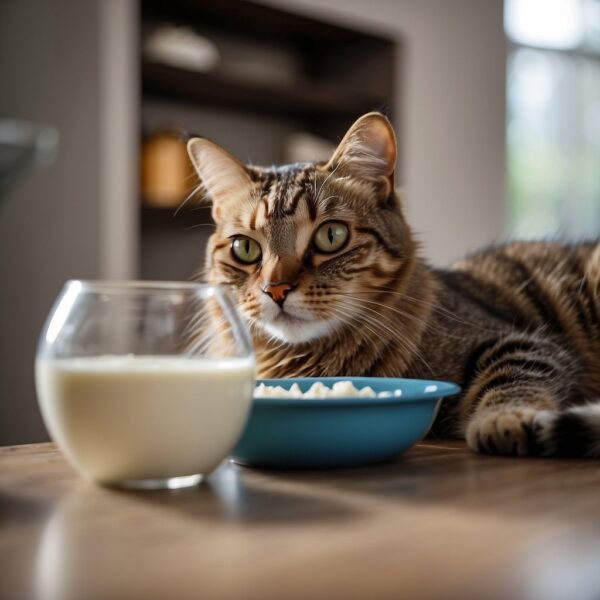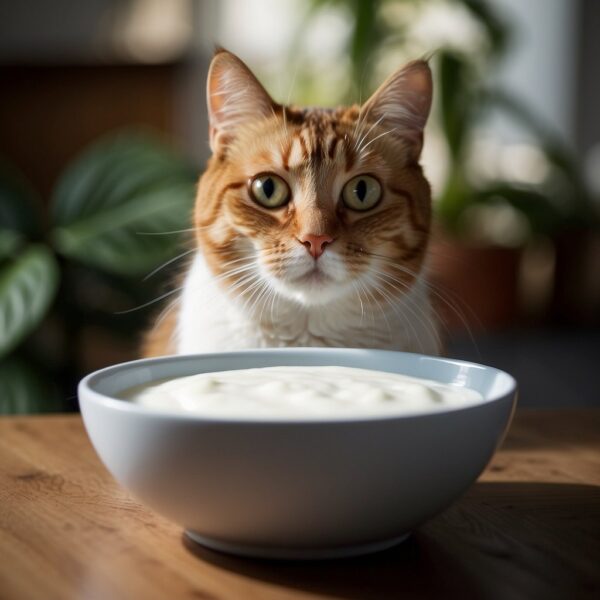
Can Cats Drink Cow Milk? Myth VS Facts
Many cat parents may envision their cats happily lapping up a bowl of milk, a common image in popular culture, but can cats drink cow milk safely? Contrary to this idyllic scene, cow’s milk is not recommended for cats. While some individual cats may not show immediate signs of distress after consuming milk, most cats lack the ability to properly digest lactose, the sugar found in milk, because they do not have sufficient amounts of the enzyme lactase after weaning.
The consumption of milk can lead to a range of digestive problems for cats. These issues can include upset stomach, cramps, and diarrhea. Aside from intolerance issues, cow’s milk is high in fats and can contribute to obesity and an unbalanced diet if offered regularly to cats. Instead of cow’s milk, water remains the best choice of hydration for cats to maintain optimal health and avoid the complications that milk may cause.
Key Takeaways
- Cow’s milk is not suitable for most cats due to lactose intolerance and high fat content.
- Digestive issues such as an upset stomach and diarrhea are common milk-related concerns in cats.
- Water is the recommended drink for cats, and a balanced diet should not include cow’s milk.
The Truth About Cats and Milk
Understanding whether cats can drink cow’s milk involves examining their digestive capabilities, the historical context, and the lactose that milk contains.
Historical Perspective on Cats Drinking Milk
Historically, the image of cats happily lapping up bowls of milk is deep-rooted in popular culture. This enduring image suggests a natural affinity between felines and milk. However, the milk traditionally offered to cats by their human keepers bears little resemblance to their mothers’ milk in terms of composition, especially when considering cow’s milk, which is designed for very different digestive systems.
Lactose Intolerance in Cats
The issue with cats drinking cow’s milk lies in lactose, a sugar found in the milk of mammals. Cats are born with the enzyme lactase, which breaks down lactose from their mother’s milk. As cats mature, their production of the enzyme lactase typically decreases, resulting in a decreased ability to digest lactose. This means many adult cats are lactose intolerant, meaning their digestive system can’t break down lactose effectively, leading to gastrointestinal problems such as vomiting and diarrhea.
How Cats Digest Milk
When considering a cat’s ability to digest milk, there are several components at play:
- Digestive Enzymes: Kittens have enzymes suitable for digesting their mother’s milk, but these often diminish after weaning.
- Lactase Levels: An adult cat typically has lower levels of lactase, reducing their ability to handle lactose.
- Milk Type: Cow’s milk contains a higher lactose content than a cat’s natural milk, making it hard for many cats to digest.
- Health Impact: For cats with sufficient lactase, small amounts of milk may not cause immediate issues, but lactose-free milk is often a safer alternative to avoid potential digestive distress.
- Nutritional Balance: Cow’s milk alone is not nutritionally complete for a cat’s diet, and reliance on it can lead to deficiencies.

can cats drink cow milk? Health Implications
Cats often struggle to process lactose found in cow’s milk, leading to various health complications like gastrointestinal problems and weight gain issues.
Common Health Issues with Milk Consumption
Lactose Intolerance: Most adult cats are lactose intolerant, which means they lack the enzyme necessary to digest lactose, the sugar in milk. This can lead to:
- Diarrhea: A frequent result of lactose intolerance, causing discomfort and potential nutrient absorption issues.
- Vomiting and Upset Stomach: The inability to process milk can cause vomiting and general gastrointestinal upset.
- Gas and Bloating: The digestive process of lactose can produce gas, resulting in abdominal bloating and discomfort.
Potential Risks for Kitten Health and cow milk
Dehydration: For kittens, the consumption of cow’s milk can be particularly dangerous. Diarrhea caused by lactose intolerance can quickly lead to dehydration, which is a significant concern for young kittens with less capacity to manage fluid loss.
Digestive Issues: A kitten’s digestive system is delicate and can be disrupted by milk, potentially impeding their growth and overall health by causing digestive upset and preventing the absorption of necessary nutrients.
Alternatives to Cow Milk for Cats
Cats do not require milk as part of their diet; water is the optimal drink for hydration. However, for those seeking alternatives to cow’s milk:
- Specially Formulated Cat Milk: Products designed for cats are lactose-free and formulated to align more closely with the feline dietary requirements.
- Water: Always the best choice for hydration, water should be fresh and readily available to cats at all times to support overall health and prevent obesity.
Safe Milk Consumption Guidelines for Cats
Milk can occasionally be a tasty treat for cats, but it’s crucial to offer the appropriate type and amount to avoid digestive issues. Not all milk is safe or beneficial to cats, and their nutritional needs must be carefully considered.
When Is Milk Appropriate for Cats?
Milk is generally not a necessary part of a cat’s diet, especially once they are weaned from kitten milk. As kittens transition to solid foods, milk becomes less important. However, in some instances, milk can be safe for cats in moderation. Lactose-free milk is a preferable choice as most adult cats have reduced lactase production, making them lactose intolerant and unable to properly metabolize the lactose in cow’s milk. For an occasional treat, a small amount of milk designated as “cat milk,” which is specifically formulated for felines, can be appropriate. It typically has reduced fat content and is either low in lactose or lactose-free.
Recommended Milk Products for Cats
When considering milk products for cats, the safest options are those tailored to feline dietary requirements:
- Cat Milk Products: Specially formulated milks for cats, which have either low-fat content or are made with lactose-free formulations.
- Kitten Milk Replacement: For kittens that are orphaned or rejected, commercial kitten milk replacement formulas are appropriate. These products are designed to mimic the nutritional profile of a mother cat’s milk.
For adult cats, the following milk products can generally be considered:
- Goat Milk: Occasionally, goat milk can be easier for cats to digest due to its slightly lower lactose levels.
- Yogurt: Plain, unsweetened yogurt in small amounts can sometimes be tolerated by cats since it contains bacteria that aid in the digestion of lactose.
It’s important to avoid regular cow’s milk and all plant-based milks such as almond, oat, or soy milk, as they lack the necessary nutrition cats need and can cause digestive upset. Also, note that even the safer milk options for cats should only supplement a complete and balanced diet, which is typically provided by high-quality wet food or wet canned food.
Supplementing Cat Diet with Milk Alternatives
When considering milk alternatives for cats, it’s vital to keep in mind the nutritional needs of felines and the potential for digestive issues. Alternative milks should be used cautiously and with a clear understanding of their benefits and limitations in a cat’s diet.
Proper Use of Milk Alternatives in Cat Diets
Milk alternatives can be incorporated into a cat’s diet primarily as an occasional treat rather than a dietary staple. Lactose-free milk is a suitable option as many adult cats possess varying degrees of lactose intolerance which can lead to digestive problems. This type of milk is processed to remove lactose, thereby reducing the risk of intestinal discomfort. For kittens, it’s important to provide formula milk specifically designed for them if the mother’s milk is unavailable, as cow’s milk and its alternatives lack the crucial nutrients required for proper growth and development.
Non-Dairy Milk Options for Cats Not Recommended
When exploring non-dairy milk options, there are several plant-based milks available. However, these should be approached with caution:
- Soy milk: It’s often enriched with vitamins and minerals but is not recommended for cats due to the presence of phytoestrogens and the fact that cats may not digest it well.
- Oat milk: While it is high in fiber and has a creamy texture, its nutritional value doesn’t align well with a cat’s dietary needs.
- Almond milk: It’s low in protein and high in fat, and although it’s not toxic, it offers no nutritional benefits to cats and may contribute to weight gain.
Understanding Plant-Based Milk and Cats
Plant-based milks like soy, oat, and almond milk contain carbohydrates and sugars that cats do not need in their diet. Cats are obligate carnivores, which means that their nutrition should come predominantly from animal protein and fat. Plant-based milks can lack the essential amino acids cats require and might also add unnecessary calories to their diet. Moreover, some cats may have allergies or sensitivities to these plant-based options. Due to the potential for these issues, any inclusion of plant-based milks in a cat’s diet should be minimal and always under the guidance of a veterinarian.

In summary, while the image of a cat lapping up a bowl of milk is culturally entrenched, providing a cat with cow’s milk is not advisable and can lead to unnecessary health complications. Instead, offering clean, fresh water alongside a balanced diet will support a cat’s nutritional requirements more appropriately.
Frequently Asked Questions
This section addresses common concerns about whether cats can safely ingest cow’s milk and explores suitable alternatives for feline hydration and nutrition.
What should I do if my cat has consumed milk?
If a cat has ingested milk and is showing signs of gastrointestinal upset, such as vomiting or diarrhea, the owner should ensure the cat has access to plenty of water and monitor their symptoms. Contacting a veterinarian is recommended if symptoms persist or worsen.
What types of milk are safe for cats to ingest?
Cats have varying degrees of lactose intolerance; therefore, milk specifically designed for cats or lactose-free milk substitutes are the safest options for those who wish to give their cat a milk-like treat.
Is milk harmful to cats, and what are the risks?
Cow’s milk is not toxic to cats, but many are lactose intolerant and cannot digest it properly. Ingesting milk can lead to digestive issues such as diarrhea, abdominal pain, and flatulence, especially in adult cats.
Can kittens consume dairy milk, or should they have a special type?
Kittens should only consume their mother’s milk or a specially formulated kitten milk replacer. Cow’s milk is not a suitable substitute as it can cause digestive problems and does not meet their nutritional needs.
Aside from water, what other beverages can cats safely drink?
Water is the best choice for keeping cats hydrated. While there are cat-specific milk alternatives available, these should be offered sparingly as treats rather than daily beverages.
Are there any dairy alternatives that are safe for cats, such as almond or goat milk?
Goat milk is often easier to digest but should still be given in moderation due to fat and calorie content. Non-dairy alternatives like almond milk are not toxic but offer no nutritional benefit to cats and may contain additives that are not cat-friendly. Always consult with a veterinarian before introducing new foods or beverages to a cat’s diet.